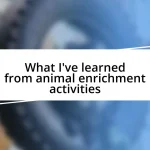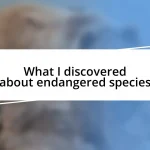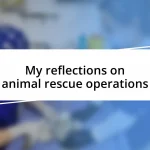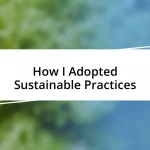Key takeaways:
- Eco-tourism promotes sustainability, cultural appreciation, and the principle of “leave no trace,” encouraging travelers to respect nature and its fragility.
- Participation in eco-tourism projects offers benefits such as environmental conservation, cultural exchange, personal growth, economic support, and advocacy for sustainability.
- Engaging with local communities enhances eco-tourism experiences and fosters positive change through shared stories and cultural connections.
- Tracking and sharing eco-tourism impacts can inspire others and help maintain accountability in personal sustainability efforts.
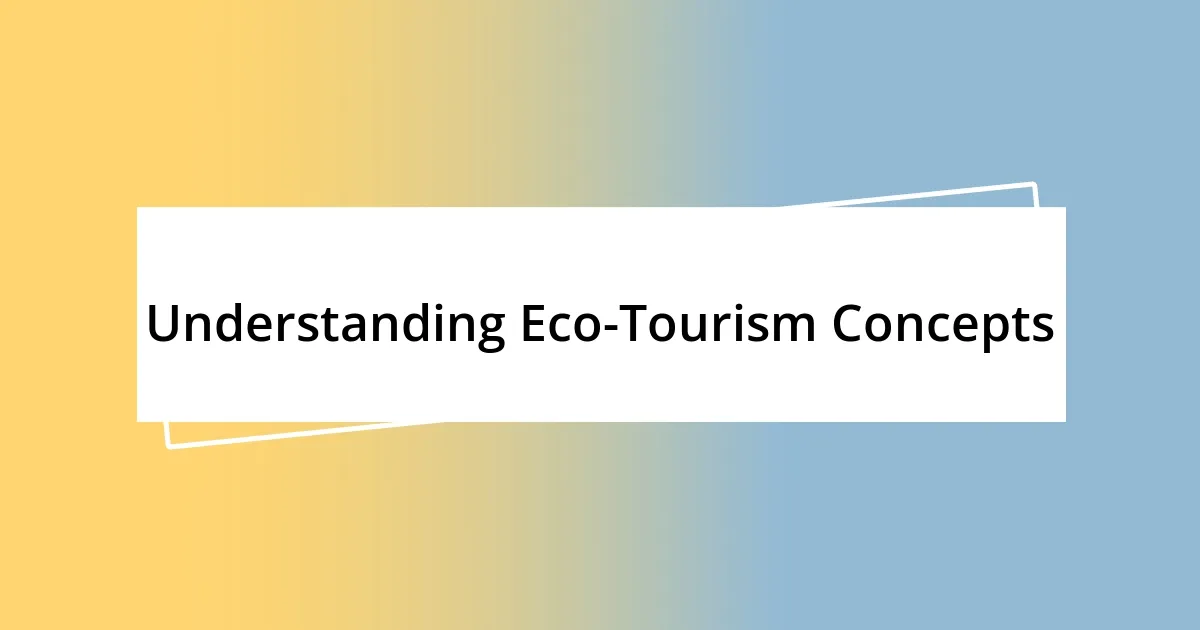
Understanding Eco-Tourism Concepts
Eco-tourism, at its core, embraces a philosophy that prioritizes sustainability and cultural appreciation. I remember my first trip to a rainforest reserve; the guide emphasized that every activity should benefit both the ecosystem and the local community. It made me reflect: how often do our travel choices truly consider the impact on the planet and the people who call it home?
One of the most fascinating concepts within eco-tourism is the principle of “leave no trace.” It’s not just a catchy phrase; it’s about cultivating a deep respect for nature and understanding the fragility of ecosystems. During a beach cleanup I participated in, seeing the pristine shoreline transform from litter-strewn to a clean habitat was incredibly rewarding. It left me wondering, how can we inspire others to adopt this mindset when traveling?
Moreover, eco-tourism is about education and experience. I still cherish the moment I listened to a local elder narrate the history of his village while surrounded by untouched beauty. It struck me then that the stories we connect with during our travels can foster empathy and inspire action. How can you make your next trip a chance to learn and grow while also giving back?
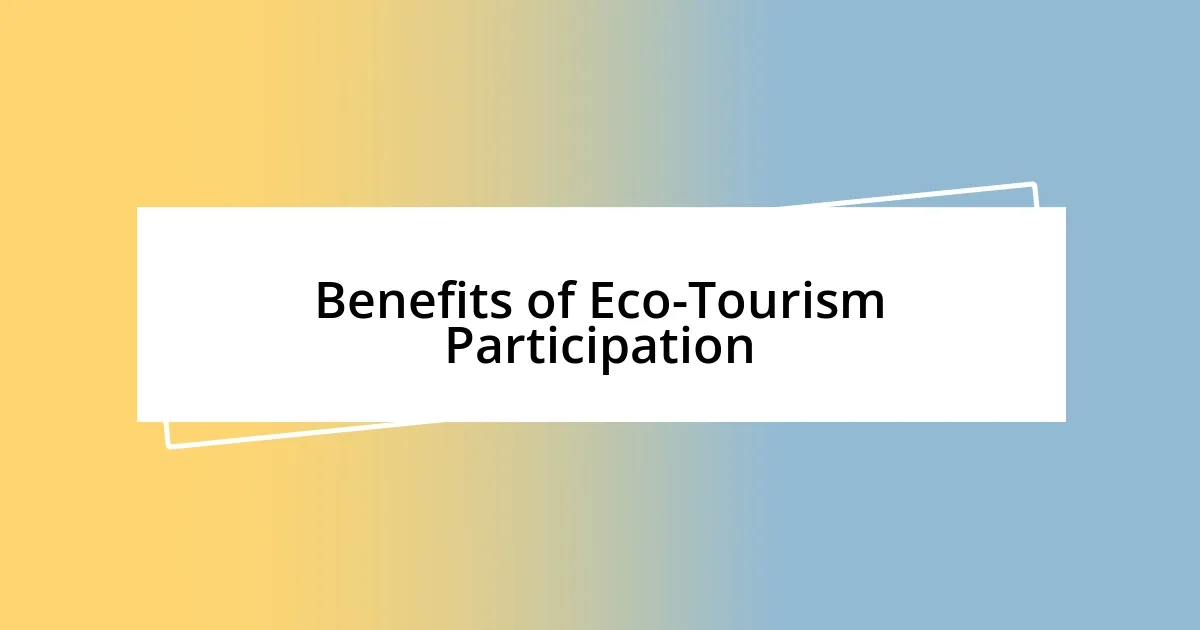
Benefits of Eco-Tourism Participation
Engaging in eco-tourism projects offers a multitude of benefits that extend far beyond just enjoying the beauty of nature. I’ve found that participating in these initiatives amplifies my connection to the environment. For instance, during a volunteering stint in a wildlife rehabilitation center, I realized how much of a difference we can make by giving our time and energy. Watching injured animals regain their strength and return to the wild seems like a small act, but it truly highlights the impact of collective efforts.
The benefits of eco-tourism participation can be categorized as follows:
- Environmental Conservation: Direct involvement in projects helps protect fragile ecosystems and endangered species.
- Cultural Exchange: By interacting with local communities, travelers gain insights into diverse ways of life, fostering understanding and respect.
- Personal Growth: Engaging in eco-tourism often pushes individuals out of their comfort zones, enhancing skills like teamwork and problem-solving.
- Economic Support: Eco-tourism initiatives often provide essential income to local communities, promoting sustainable livelihoods.
- Awareness and Advocacy: Participation can ignite a passion for environmental issues, encouraging travelers to become advocates for sustainability in their own communities.
Moving beyond mere enjoyment, every experience in eco-tourism allows me to actively contribute to a wider cause, which deeply enriches my travels. Each project I’ve engaged in has not only broadened my understanding but also embedded a sense of responsibility in my travel choices.
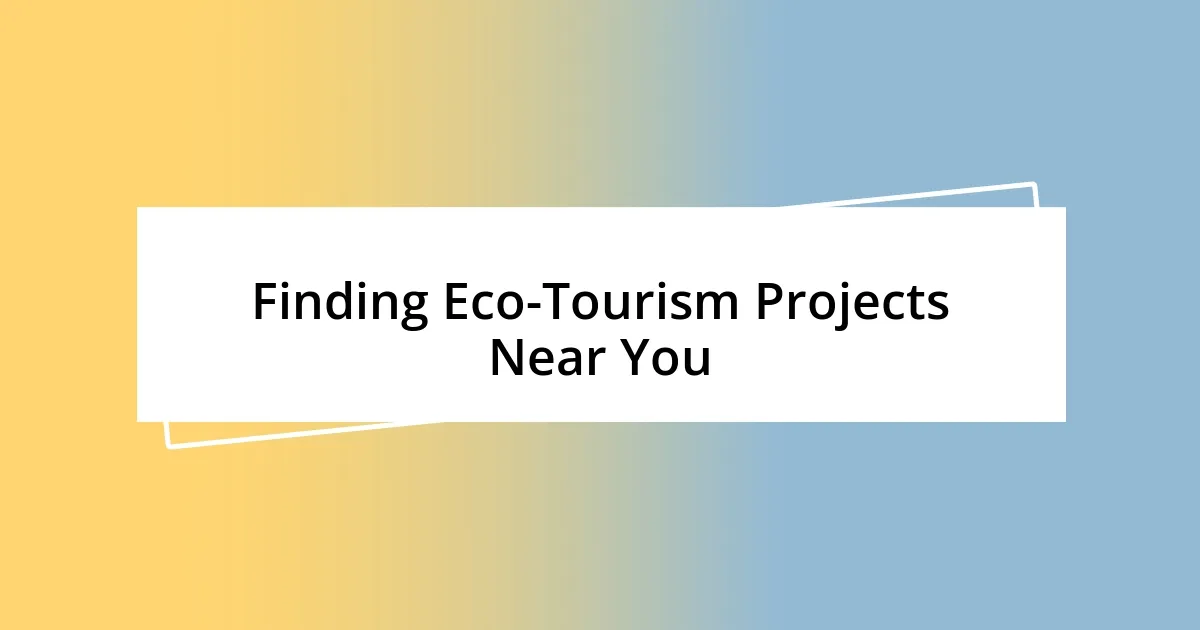
Finding Eco-Tourism Projects Near You
Finding eco-tourism projects near you can be an exciting and fulfilling endeavor. I often start my search by browsing local community boards and social media groups focused on sustainability. It’s incredible how many hidden gems are out there waiting to be discovered within your community. Once, I stumbled upon a community garden project that not only beautified the neighborhood but also educated families about sustainable practices. Engaging with such projects can truly spark a sense of belonging and connection.
Another effective method is to visit dedicated eco-tourism websites or platforms that list projects based on your location. I remember using one of these platforms to find a weekend retreat that involved reforestation efforts. Being part of such activities, where I planted trees alongside like-minded individuals, was both uplifting and immersive. It reminded me that eco-tourism thrives on collaboration, and it feels amazing knowing I played a part in nurturing our planet.
Lastly, don’t overlook local nature reserves or parks, which often host volunteer days or educational workshops. I recall volunteering at a nearby wildlife sanctuary, which was an experience filled with laughter and learning. Each friendly exchange with fellow volunteers transformed my perception of nature. These spaces are wonderful for building relationships, and they provide a hands-on opportunity to support wildlife conservation right in your backyard.
| Resource Type | Benefits |
|---|---|
| Community Boards | Connects you with local initiatives and fosters community involvement. |
| Eco-Tourism Websites | Offers a wide range of projects, facilitating easy participation in sustainability efforts. |
| Local Nature Reserves | Provides hands-on experiences that deepen understanding and appreciation for local wildlife. |
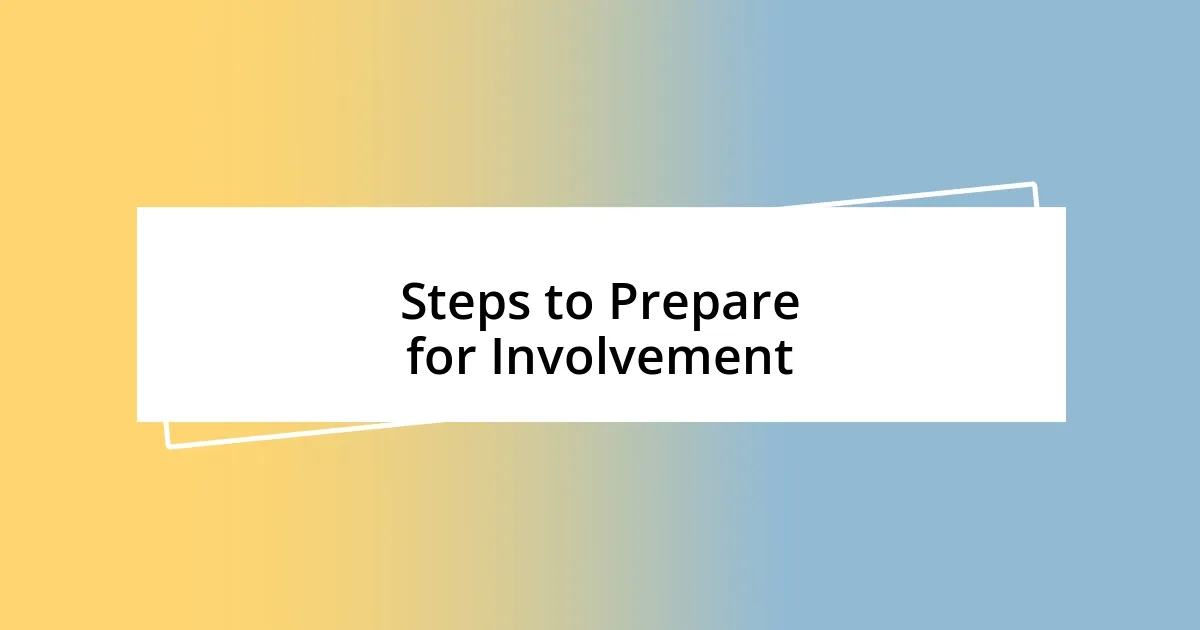
Steps to Prepare for Involvement
Preparing for involvement in eco-tourism projects requires a bit of groundwork, and I’ve found that having a clear plan can make all the difference. I usually begin by identifying my interests—am I more drawn to wildlife conservation, community development, or cultural exchange? Understanding what resonates with me is key. For example, after some reflection, I realized my passion lies in helping to restore natural habitats, which directed my efforts toward projects like wetland restoration.
Next, researching specific projects is essential. I remember scrolling through an eco-volunteering website and feeling a surge of excitement when I found a marine conservation initiative that involved coral reef rehabilitation. How often do we get the chance to make a tangible contribution to something so vital? I couldn’t wait to be part of that effort. I recommend also reading reviews and testimonials from other volunteers, as they can provide insights that weren’t covered in the project descriptions.
Finally, preparing mentally and physically for the activities involved can really set you up for success. I always remind myself to pack more than just essentials—bringing an open mind and a willingness to learn goes a long way. On one occasion, I participated in a project that challenged my physical limits, but each struggle was a learning experience that expanded my capabilities. Are you ready for such growth? Embrace it! Your journey in eco-tourism will lead not only to personal enrichment but to a collective impact on our planet.
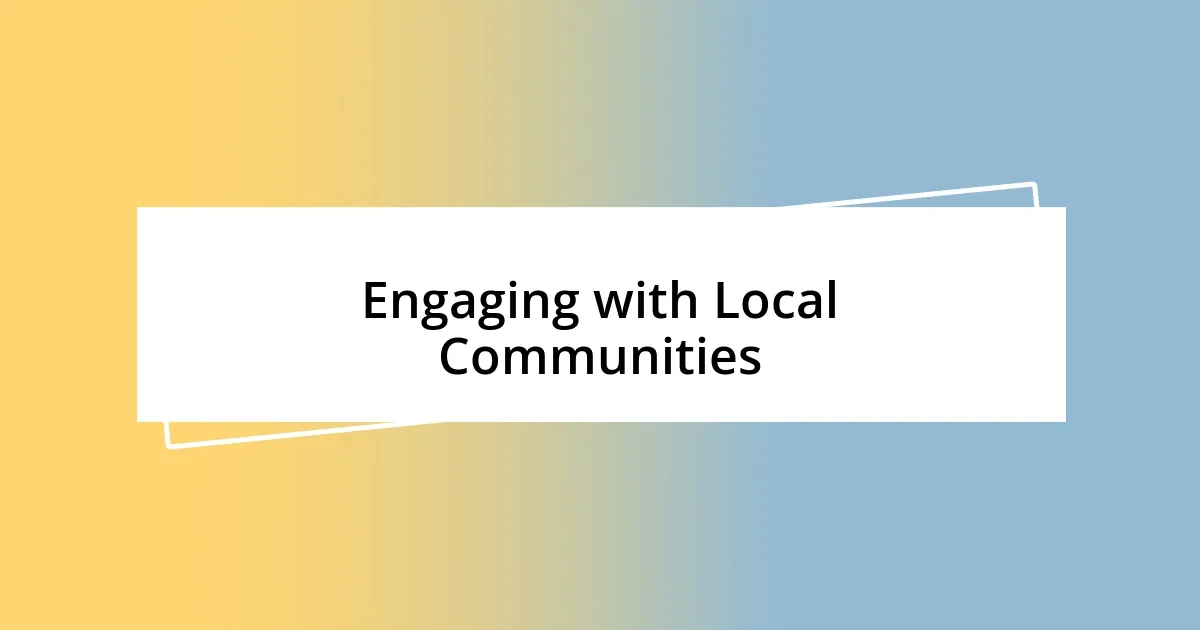
Engaging with Local Communities
Engaging with local communities has always added a rich layer to my eco-tourism experiences. I remember visiting a small village where the locals welcomed us with open arms. They shared their stories about sustainable practices that have been passed down for generations. How often do we get the opportunity to learn firsthand from the very people who live in harmony with nature? It was eye-opening and ignited my passion for supporting their efforts.
I also took part in a workshop where local artisans taught us to craft with materials sourced from the land. It was amazing to see how they transformed natural resources into beautiful, functional art. Feeling the pride in their work made me realize that eco-tourism isn’t just about the destination; it’s about the relationships built. Each shared laugh and lesson deepened my appreciation for their culture and commitment to sustainability. What better way to contribute than to empower these communities through shared knowledge?
Throughout my journey, I learned that engaging with local communities can create a ripple effect of positive change. For example, after participating in a beach cleanup organized by local youth, it struck me how their passion could inspire others to take action. The enthusiasm was contagious, and it became clear that when we engage collaboratively, we amplify our impact. Have you ever felt that spark of connection? Those moments are what make eco-tourism uniquely transformative.
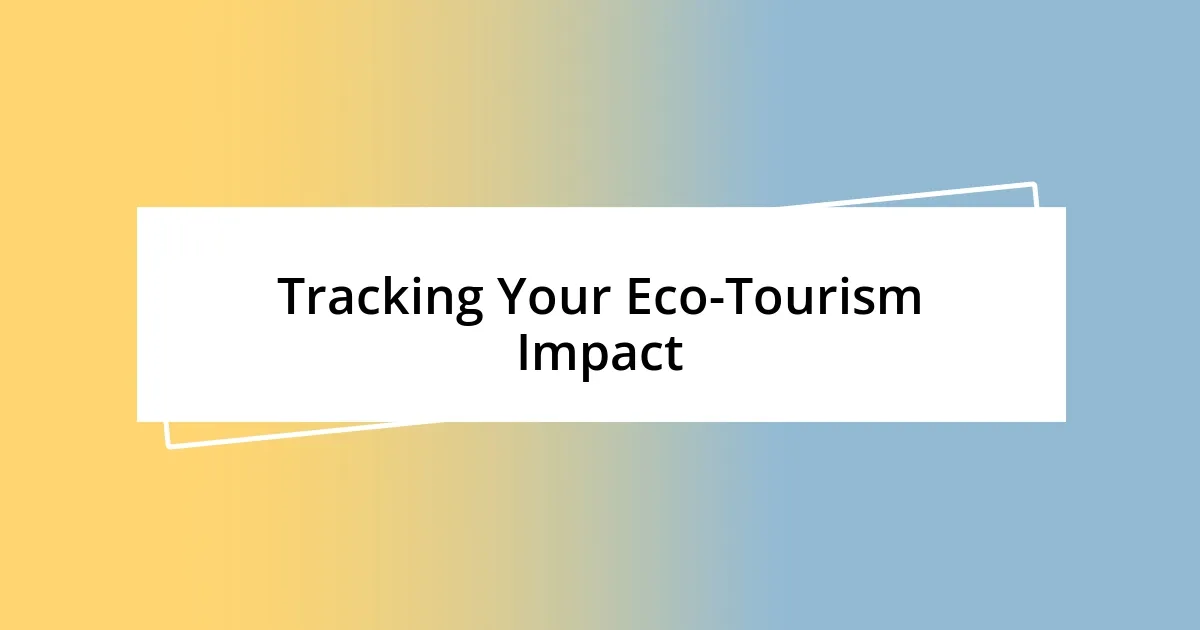
Tracking Your Eco-Tourism Impact
Tracking your eco-tourism impact has been one of the most enlightening aspects of my journeys. I often find myself documenting specific goals I want to achieve—like preserving a certain area or contributing to community education efforts. One profound experience came when I joined a project that measured tree growth in a reforestation area. Seeing those tiny saplings grow over the months made me realize how tangible our efforts can truly be. Have you ever watched a small action blossom into something much larger?
I also recommend finding ways to quantify your contributions. For instance, during a wildlife monitoring project, I logged each sighting of endangered species, which ultimately helped the team gauge population improvements. Sharing those findings on social media felt empowering; it wasn’t just about my experience but about raising awareness. Tracking personal anecdotes and data allows me not only to see my own progress but also to inspire others. Have you considered how tracking your involvement might change your perspective?
Using reflective tools like journals or even social media hashtags has become invaluable for me. I keep a photo diary of my eco-tourism activities, reflecting on the emotions tied to each moment—the joy of spotting a rare bird or the sadness of litter on a pristine beach. Capturing these moments helps me remain accountable and stay connected to my purpose in eco-tourism. What methods have you used to keep your commitment alive? My journey has shown me that each marker of impact can serve as a reminder of the difference we can make together.
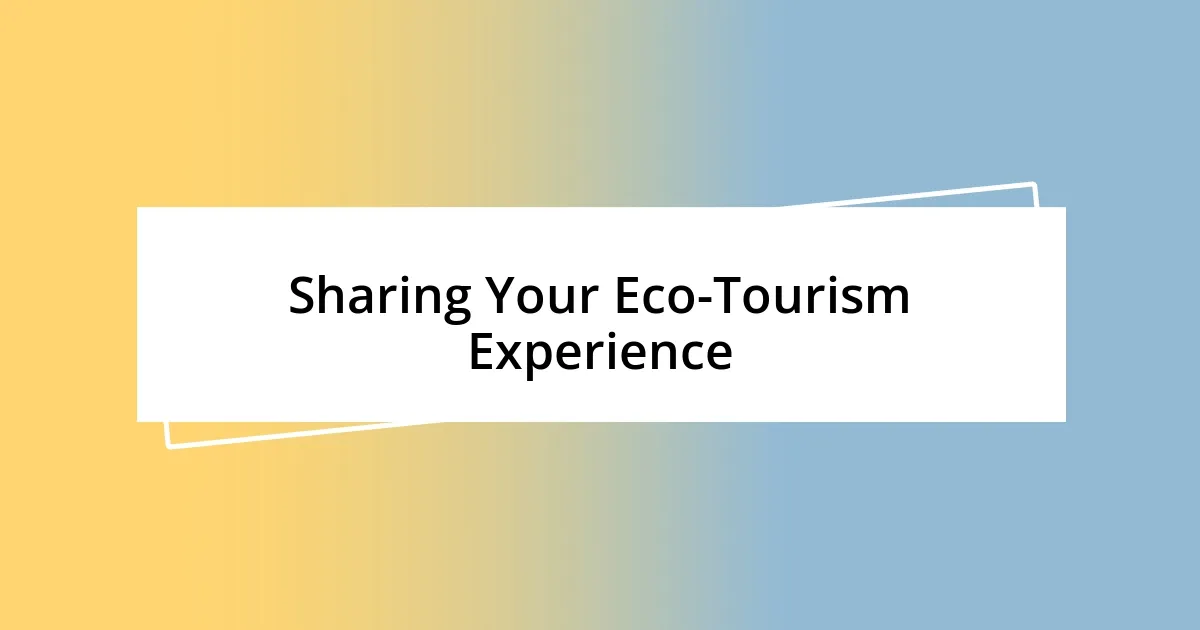
Sharing Your Eco-Tourism Experience
Sharing my eco-tourism experiences has become a powerful way to engage others and elevate the conversation around sustainability. I distinctly remember chatting with friends after a stay at an eco-lodge in the rainforest, where the owners shared their journey of transforming an old logging camp into a sanctuary for wildlife. Listening to their commitment ignited a spark in my friends, and we found ourselves contemplating ways to support similar projects back home. Isn’t it fascinating how stories have the power to inspire action?
Moreover, writing blog posts about my eco-adventures became a therapeutic outlet for me. I vividly recall my visit to a marine protected area; I would describe the thrill of swimming alongside sea turtles and the heartbreak of seeing coral bleaching firsthand. Sharing these contrasts not only helped raise awareness but also connected me with like-minded individuals who shared their own stories. Have you ever posted an experience that sparked a lively discussion or even prompted someone to take their first eco-tourism trip?
When I post on social media about my eco-tourism experiences, I always include tips and suggestions for others. After participating in a sustainable farming project, I began recommending ways to incorporate local food into travel itineraries. It was fulfilling to see my followers embrace these ideas and even adapt them into their own travels. I can’t help but wonder, how can your unique experiences resonate with those around you? Each shared moment enriches our collective journey toward sustainability.

